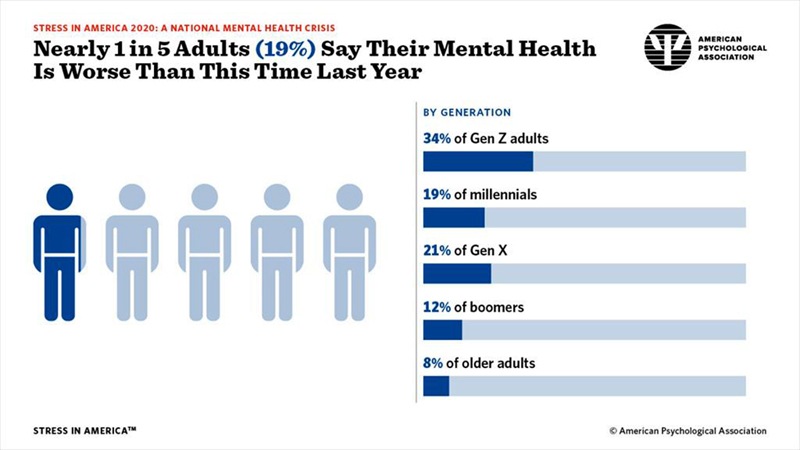As the COVID-19 pandemic reached its one-year anniversary, there has been a lot of focus on physical well-being. As the world has turned on its head in the last year, the mental toll of the pandemic exacerbated the issues of stress management.
The American Physiological Association described stress in the United States in 2020 as “a national mental health crisis” and one which would leave a lasting impact on American society for years to come.
The issue is particularly pronounced in younger generations, with Gen Z adults, ages 18-23, and Gen Z teens, ages 13-17, the youngest group surveyed by the APA as the most stressed-out age groups.
The pandemic is the No. 1 source of stress for all age groups surveyed by the APA, while seven of 10 said they had experienced increased stress during the pandemic.
Despite several months of acclimating to a new reality and societal upheaval spurred by the COVID-19 pandemic, Americans are struggling to cope with the disruptions it has caused. Nearly eight in 10 adults (78 percent) say the coronavirus pandemic is a significant source of stress in their life. And, two in three adults (67 percent) say they have experienced increased stress over the course of the pandemic.
“When considering the physical and emotional toll of increased stress, nearly half of adults (49 percent) report their behavior has been negatively affected. Most commonly, they report increased tension in their bodies (21 percent), ‘snap-ping’ or getting angry very quickly (20 percent), unexpected mood swings (20 percent), or screaming or yelling at a loved one (17 percent),” the report states.
The uncertainty caused by the pandemic is disproportionately impacting young people, such as members of Gen Z who are in more transitional phases of their life, such as going off to college or beginning their careers. As a result, half of Gen Z people say they feel like planning for the future has become impossible, according to the report.
Doctors Byron McClure and Earl Turner, who were among the team of physicians providing counsel on the report, suggest some of the best ways to provide support to Gen Z are by ensuring that familial connections are maintained, even for those who have left home.
“Create meaningful opportunities for connections with family, culture and community. Although many have left home physically, these connections remain fundamental to youth well-being,” the report says.
While the impacts have been seen most obviously in Gen Z, these factors, as well as traditional stressors, such as the future of the country and financials, appear in every generation with varying severity.
“Nearly 1 in 5 adults (19 percent) say their mental health is worse than it was at this time last year,” the report reads. “By generation, 34 percent of Gen Z adults report worse mental health, followed by Gen X (21 percent), millennials (19 percent), boomers (12 percent) and older adults (8 percent).”
While the stress response is natural, and one that helps humans prepare for unusual events or circumstances, the APA describes the current circumstance as one which provides unprecedented levels of stress.
“We are currently living through a period of unprecedented stress, and this can impact every part of our lives — including our ability to accomplish basic tasks, maintain our relationships, and even use our bodies,” the APA says.
In order to help cope with stress, the APA suggests using quick, action-oriented exercises which can help manage the effects.
The first of the suggestions is a breathing exercise: breathing in for four seconds, holding the breath for four seconds and then exhaling for six. This is effective because it allows the body to recalibrate as well as lowering levels of psychological arousal.
Additionally, they suggest using refocusing by counting backwards from 100 in variables of three, which will help the mind to break out of a pattern of racing thoughts by giving it a tangible task to work on.
“Focusing in a structured way and engaging your brain in a distracting task can disrupt unhelpful patterns,” the report says.
Additionally, the Mayo Clinic suggests the best way to begin managing your stress is to identify the things that trigger it.
“What makes you feel angry, tense, worried or irritable? Do you often get headaches or an upset stomach with no medical cause?” a Mayo Clinic article asks.
“Some stressors, such as job pressures, relationship problems or financial concerns, are easy to identify. But daily hassles and demands, such as waiting in a long line or being late to a meeting, also contribute to your stress level.”
While some stressors can be eliminated through individual action, such as moving the computer to a different room to allow the mind to wind down, others, such as the pandemic or work, are beyond control.
In those cases, the Mayo Clinic suggest looking at how you respond to the stressor and finding a way to change your reaction.
“Don’t feel like you have to figure it out on your own,” the article says. “Seek help and support from family and friends, whether you need someone to listen to you, help with child care or a ride to work when your car’s in the shop.”
The Mayo Clinic also recommends following the Four As as another method of stress relief: avoid, alter, accept and adapt. Each is useful depending on the situation.
Maintaining a healthy lifestyle will also help with mental health, in addition to the benefits it provides to the physical being.
“Stress won’t disappear from your life,” The Mayo Clinc says. “Stress management needs to be ongoing. But by paying attention to what causes your stress and practicing ways to relax, you can counter some of the bad effects of stress and increase your ability to cope with challenges.”
For more information about the Four As, visit mayoclinic.org/healthy-lifestyle/stress-management/in-depth/stress-relief/art-20044476

















